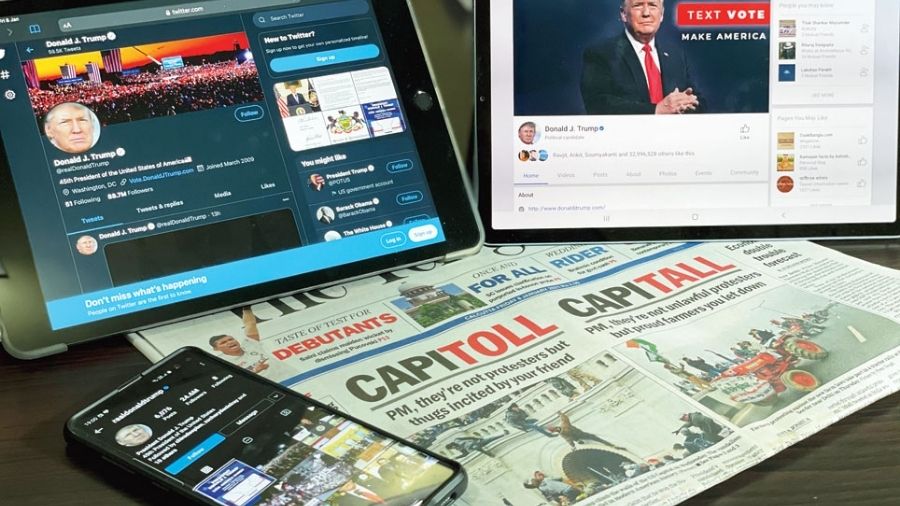Too late? Taking away outgoing US President Donald Trump’s social media megaphone only after violent protests at the Capitol has raised several questions over whether digital platforms need more regulation as well as the future potential of alternative or niche services.
In the coming months, all eyes will be on President-elect Joe Biden as he navigates troubled waters over Section 230 (an Internet legislation in the United States) as well as how efficiently the likes of Facebook and Twitter handle far-right activists and groups who embrace violence. People like Tim Gionet, a Trump supporter (better known by his online alias ‘Baked Alaska’), who livestreamed the recent tumult on Dlive (he was kicked off Twitter in 2017), and Richard Barnett, who left a message for US House speaker Nancy Pelosi saying “We will not back down”, will go to any extent to get heard.
Social media without Trump
The first steps taken by Facebook and Twitter appear proactive, booting Trump — from a few hours to a couple of weeks, at least — off social media completely.
Facebook founder and CEO Mark Zuckerberg responded with “indefinitely” (at least two weeks) banning Trump’s account, including on Instagram, while Twitter first locked him out of his account for 12 hours with the Twitter Safety account citing “repeated and severe violations of our Civic Integrity policy”. Jack Dorsey’s company required the removal of a few of Trump’s tweets, including a fire-fuelling video.
Next, on Friday, Twitter took a step that could have been taken earlier: Ban him permanently. It’s a historic rebuke of a man who had used the platform for his rise to White House. In a blog post, the company said that two tweets that Trump had posted a few days ago — one calling his supporters “patriots” and another saying he would not go to the presidential inauguration on January 20 — violated its rules on glorifying violence.
A bigger concern is whether social media platforms can survive without Trump or like-minded personalities. Trump’s Twitter account (until it was suspended) had close to 89 million followers, representing around 48 per cent of the company’s total base of monetisable daily active users (reported at the end of the third quarter), according to The Wall Street Journal. Compare this with the marketing maverick’s around 35 million followers on Facebook or less than two per cent of the company’s 1.8 billion daily active users.
Cracking down comes with its cost. There is a chance that Twitter may have fewer engagements in the coming months as the US political situation stabilises and the vaccine rollout gets better. In the same breath, one needs to mention that even though Facebook has spread out its user base across platforms — after all, it’s wise not to have all the eggs in one basket — the situation is becoming difficult.
Chris Sacca, an early Twitter and Instagram investor, has pointed fingers at Zuckerberg and Jack Dorsey with the tweet: “You’ve got blood on your hands, @jack and Zuck. For four years you’ve rationalised this terror. Inciting violent treason is not a free speech exercise. If you work at those companies, it’s on you too. Shut it down.” Roger McNamee, who has authored Zucked: Waking Up to the Facebook Catastrophe, tweeted: “Internet platforms — FB, Instagram, Google, YouTube, Twitter, etc. — enabled this. They amplified hate speech, disinformation, and conspiracy theories because it was profitable. They are accessories to the felonies we are seeing on our TVs... and many others.”
26 powerful words
If disinformation spreads violence and conspiracy theories, shouldn’t social media companies take more responsibility? All eyes shift to Section 230, which is under scrutiny at the moment. US citizens are free to speak their mind but they are not free of responsibility for what they say. In other words, those making defamatory speeches can be sued. For traditional media, it is the responsibility of the publisher not to publish such speeches. The same doesn’t apply to online services because of Section 230.
In the early 1990s, digital forums were taking small steps; it was where netizens could post just about anything without the fear of consequence. Nobody foresaw the power of social media. Section 230 arrived in 1996. It was passed into law as part of the Communications Decency Act. The legislation ensures that providers of Internet forums are not liable for user-posted speech (with a few exceptions).
The 26 powerful words that make the Internet what it is are: “No provider or user of an interactive computer service shall be treated as the publisher or speaker of any information provided by another information content provider.”
So “an interactive computer service” can’t be treated as a publisher or speaker of third-party content, protecting websites from lawsuits if somebody decides to post something out of the line. If there was no Section 230, website owners would be more responsible for what happens on their websites. But such a move also puts more power in the government’s hands. If it is changed then platforms like Facebook and Twitter will become like television channels — entertaining to a point but mostly bland. At the moment, they wield a lot of power.
President-elect Joe Biden is not a big fan of the law. In an interview with The New York Times early last year he said: “I’ve been in the view that not only should we be worrying about the concentration of power, we should be worried about the lack of privacy and them being exempt, which you’re not exempt. [The Times] can’t write something you know to be false and be exempt from being sued. But he can. The idea that it’s a tech company is that Section 230 should be revoked, immediately should be revoked, number one. For Zuckerberg and other platforms.” For Biden, it’s about taking responsibility. “You guys still have editors. I’m sitting with them. Not a joke. There is no editorial impact at all on Facebook. None. None whatsoever. It’s irresponsible. It’s totally irresponsible.”
Head over to Europe where the European Commission announced draft rules in December to handle tech giants. At play are the Digital Markets Act (DMA) and the Digital Services Act (DSA). DMA focuses on the regulation of “gatekeepers” — those behind “entrenched” services that other businesses use to provide their own products. DSA aims to create a set of rules for the EU to keep users safe online, protect freedom of expression and also help them (and local authorities) to hold tech companies to account.
Right now, it’s about CEOs making an effort to take action against certain social media accounts. There needs to be more transparency and similar action needs to be taken against similar offenses; it can’t be selective.
Rise of niche services
At the moment, a Donald Trump can take his “business” to a niche platform and his like-minded followers will also take the plunge. More of a short-term strategy but alt-platforms like Parler (Google Play has banned the app and Apple may take a similar step) and Gab are becoming the place for those who have been forced to leave mainstream apps. Of course, these are not forums with the reach of mainstream platforms but discussions here are more heated. Take the example of TheDonald.win, a forum “for serious supporters of President Trump”. The man likes a big stage, which such platforms can’t offer but they can certainly foment support. The New York Times has reported that on Wednesday night, Gab’s chief executive, Andrew Torba, said he was “in the process of connecting with President Trump’s team” about setting up the president’s account. Baked Alaska used a livestreaming site called Dlive to broadcast his actions inside the Capitol. According to reports, through Dlive, his fans then sent him messages telling him where to go to avoid capture by the police. He was also given “lemons,” a Dlive currency that can be converted into real money.
Twitter is also keeping track of roundabout ways the US President is trying to make his voice heard. On Friday night, with his personal account banned, Trump used the official @POTUS account (reserved for the current President of the United States; will be handed over to Joe Biden on January 20) to tweet (now deleted): “We have been negotiating with various other sites, and will have a big announcement soon.”
It’s the same man who told The Financial Times in April 2017: “Without the tweets, I wouldn’t be here.”
Franklin D. Roosevelt had a radio persona that won over hearts with fireside chats. The energetic John F. Kennedy used the power of television. Then came a real Hollywood charisma called Ronald Reagan, “the Great Communicator”. Barack Obama took advantage of online videos. And here’s Donald Trump, the ‘social media president’. Facebook and Twitter have the power to relegate Trump to a post-presidential retirement home but will the man make a comeback? If yes, it will be minus any help from Facebook or Twitter.

Supporters of President Trump climb the west wall of the US Capitol last week in Washington. Picture by AP
Nobody foresaw the power of social media in the early ’90s. Section 230 arrived in 1996... If there was no Section 230, website owners would be more responsible for what happens on their websites. But such a move also puts more power in the government’s hand
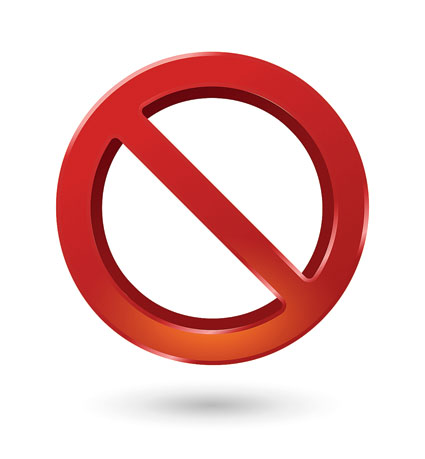
Wrist slaps
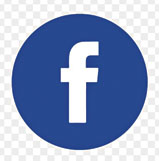
Facebook: We believe the risks of allowing the president to continue to use our service during this period are simply too great, so we are extending the block we have placed on his Facebook and Instagram accounts indefinitely and for at least the next two weeks.

Twitter: After close review of recent Tweets from the @realDonaldTrump account and the context around them — specifically how they are being received and interpreted on and off Twitter — we have permanently suspended the account due to the risk of further incitement of violence. Our public interest framework exists to enable the public to hear from elected officials and world leaders directly. However, we made it clear going back years that these accounts are not above our rules entirely and cannot use Twitter to incite violence, among other things.
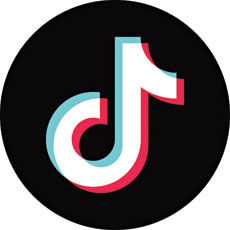
TikTok: Hateful behaviour and violence have no place on TikTok. Content or accounts that seek to incite, glorify, or promote violence violate our community guidelines and will be removed.
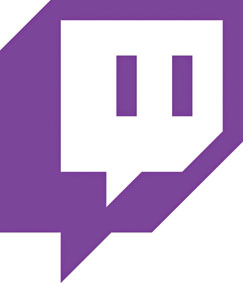
Twitch: In light of yesterday’s shocking attack on the Capitol, we have disabled President Trump’s Twitch channel. Given the current extraordinary circumstances and the President’s incendiary rhetoric, we believe this is a necessary step to protect our community and prevent Twitch from being used to incite further violence.

